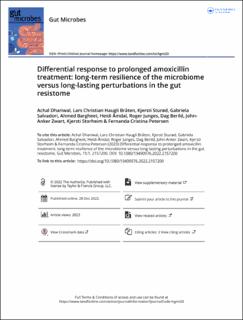Differential response to prolonged amoxicillin treatment: long-term resilience of the microbiome versus long-lasting perturbations in the gut resistome
Dhariwal, Achal; Bråten, Lars Christian Haugli; Sturød, Kjersti; Salvadori Da Silva, Gabriela; Bargheet, Ahmed; Åmdal, Heidi Aarø; Junges, Roger; Berild, Dag; Zwart, John Anker Henrik; Storheim, Kjersti; Petersen, Fernanda Cristina
Peer reviewed, Journal article
Published version
Permanent lenke
https://hdl.handle.net/11250/3111027Utgivelsesdato
2023Metadata
Vis full innførselSamlinger
Originalversjon
10.1080/19490976.2022.2157200Sammendrag
The collateral impact of antibiotics on the microbiome has attained increasing attention. However, the
ecological consequences of long-term antibiotic exposure on the gut microbiome, including anti-
biotic resistance, are still limited. Here, we investigated long-term exposure effects to amoxicillin on
the human gut microbiome and resistome. Fecal samples were collected from 20 patients receiving
3-months of amoxicillin or placebo treatment as part of a Norwegian multicenter clinical trial on
chronic low back pain (AIM study). Samples were collected at baseline, last day of treatment, and
9 months after antibiotic cessation. The abundance and diversity of microbial and resistome composi-
tion were characterized using whole shotgun and functional metagenomic sequencing data. While
the microbiome profiles of placebo subjects were stable over time, discernible changes in diversity
and overall microbiome composition were observed after amoxicillin treatment. In particular, health-
associated short-chain fatty acid producing species significantly decreased in proportion. However,
these changes were short-lived as the microbiome showed overall recovery 9 months post-treatment.
On the other hand, exposure to long-term amoxicillin was associated with an increase in total
antimicrobial resistance gene load and diversity of antimicrobial resistance genes, with persistent
changes even at 9 months post-treatment. Additionally, beta-lactam resistance was the most affected
antibiotic class, suggesting a targeted response to amoxicillin, although changes at the gene level
varied across individuals. Overall, our results suggest that the impact of prolonged amoxicillin
exposure was more explicit and long-lasting in the fecal resistome than in microbiome composition.
Such information is relevant for designing rational administration guidelines for antibiotic therapies.

